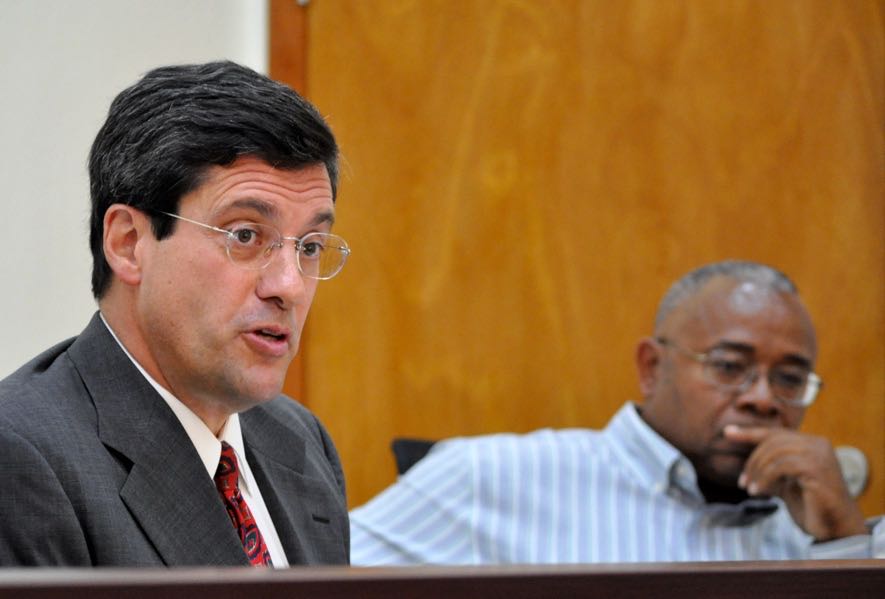
The testimony, which came primarily from economic consultant Donald Parrish on behalf of VITELCO, contradicted recommendations made by the PSC-hired consulting firm Georgetown Consulting Group that the utility substantially lower its rates.
Georgetown Consulting, after its own analysis, recommended an annual rate reduction of $9.6 million, which would amount to a $12.94 decrease of VITELCO’s monthly rate for residential phone lines and a $34.98 decrease of its business line rate.
Attorney for VITELCO Bennett Ross said it is the company’s position that those recommendations should be rejected by the PSC. He said that if the company decreases its rates by $9.6 million, it will also lose an additional $2.4 million in universal service subsidies it receives from the federal government.
“Hopefully Georgetown can explain how it is that a reduction of revenues of $12 million would allow VITELCO to continue to invest in its network and continue to service its customers,” said Ross. “No such explanation appears.”
Witnesses for the staff of the PSC or Georgetown Consulting did not testify at Monday’s hearing.
Georgetown last recommended that VITELCO lower its telephone rates in 2008, but the PSC ended up rejecting those recommendations.
Ross said that telephone rates in the territory have remained unchanged since 2003, and that during that 12-year period VITELCO has consistently earned below its authorized rate of return. The company’s rate for a basic residential line is $21.65.
According to Parrish, VITELCO’s rates are not high in comparison to telephone companies in other U.S. jurisdictions despite some characterizations to that effect made prior to the hearing. He said an FCC-established range for reasonable monthly residential rates sets the floor at $21.22 and the ceiling at $47.48.
Ross pointed out in his opening statement that since the PSC last examined the VITELCO’s rates in 2008, the company has invested $125 million dollars in updates to its network, including a conversion to fiber-optic cable.
At the same time the company’s customer base has been shrinking thanks to the declining popularity of landline phones. In 2008, VITELCO had 61,000 lines in service. By the end of 2014, that number had dropped to less than 39,000.
“The record shows that VITELCO continues to shed telephone customers,” said Ross. “This phenomenon is being experienced by every telephone company in the states.”
Ross said that VITELCO’s increase in investment expenditures and its decrease in phone customers leaves the company with little other option than to request the PSC approve rate increases.
“Since the last rate proceedings in 2008, when the PFC found that VITELCO was only earning a 9.28 percent return, the company’s subscriber base has fallen by 39 percent and its local regulated revenues have fallen by 36 percent,” he explained.
Parrish testified that for the 12-month period ending in May 31, 2016, VITELCO’s after tax-break return will amount to just 4.49 percent. VITELCO has said that an appropriate rate would be closer to 14 percent.
In order to meet the goal of a 13.79 percent return, the company would have to increase its annual revenue by $9.9 million. The only way to realistically raise that revenue, said Parrish would be through rate increases.
He said that although VITELCO has not officially requested any specific increases yet, in order to meet the numbers in his analysis, residential phone rates would need to by increase by $13.41 per month and business line rates would have to increase by $36.27.
When asked during cross examination by PSC attorney Boyd Sprehn why, leaving aside a rate freeze from 2010 to 2014, VITELCO has not requested a rate increase in 12 years, Parish said “there are many factors that a company weighs in that decision, including market factors, political and regulatory environments, and other uncertainties.”
The hearings will continue on St. John on Tuesday. They will conclude on Thursday on St. Croix.
Although members of the public may give testimony at the hearings, none did so on Monday.
Ronald Belfon acted as hearing examiner on Monday. PSC Executive Director Donald Cole was also present.


